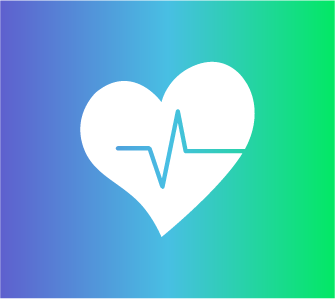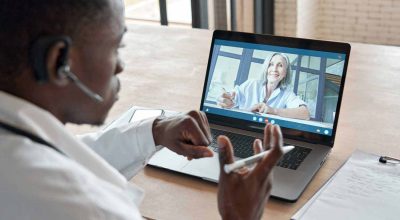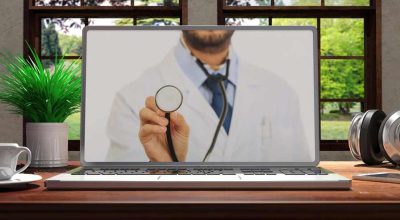Social media has gone from a novelty to a source of stress and competition among many people. The desire to present oneself online in a very specific manner or the sheer volume of bad takes and misinformation can be dizzying. These are problems for anyone using Facebook or Twitter in particular, where anti-science rhetoric is rampant.

As a physician, you may find yourself up against a burnout wall because of social media. Online communities can be a great place to collaborate with peers and interact with patients, but they can also be a source of emotional stress. Too much social media, when coupled with work and life stress, can quickly lead to burnout.
Thankfully, you can reduce your chances of being overwhelmed by social media stress before it has a chance to take hold.
Why Does Social Media Wear Us Down?
While you can engage with social media on a purely shallow level—sharing funny cat memes, family photos, and recipes—for most people, it’s hard to only engage at that level. Especially as a physician, you likely see a tremendous amount of disinformation and anti-science sentiment daily through social sites.
Sites like Facebook are algorithmically designed to show you engaging posts, and in most cases, engagement comes from interaction. Comments and posts that are inflammatory and get people arguing are simply more likely to be seen and shared. It can be extremely hard to avoid fights about sensitive and hotly debated topics, such as vaccines, politics, or climate change.
When you engage in these battles, you have to know when you go in that there is no victory. Nobody on social media ever said “that’s a well-reasoned, thought-provoking point you make” and then changed their mind. And the people with the worst ideas feel like the loudest.
Social media is a psychological extension of ourselves, which makes it difficult to simply let go of insults, ignorant comments, and conspiracy and anti-science rhetoric. Especially as a physician, seeing certain comments or opinions about your field of expertise from inexperienced individuals can be triggering and upsetting—and, like we previously mentioned, difficult to remove from your social feed completely.
News is Rough
The world has always had tragedy, but we’ve never had access to it all, unfiltered, the way we have since the Iinternet. Again, because outrage, fear, and anger promote engagement, we see that more often than lighter content. Seeing nothing but negativity in your feed is no doubt disheartening and sad, and this constant barrage of bad news can contribute to stress, burnout, and nihilism.
But remember that the news we see on social media isn’t indicative of the world at large—the posts with the most engagement receive the most attention, and there are good stories out there that can instill hope and provide comfort. Regardless, energy is required to seek out these stories, and energy can be hard to conjure up when you’re surrounded by this negative, curated view.
How to Fight Back Against Social Media Burnout
Burnout is never due to a single factor; rather, it’s a combination of work and life stress that overwhelms us. The problem with social media is that, instead of being a relaxing agent, it’s often a contributing factor. The dopamine hit that scrolling provides is enough to get us hooked, but we’re still addicted to the scroll even when we’re no longer enjoying ourselves.
Stop Doomscrolling
The concept of “doomscrolling” is one that many people can relate to—mindlessly falling down a negative topic rabbit hole. Social media is designed to show you more of what you interact with, and since we’ve already established that negative concepts brew engagement, it can be a self-fulfilling cycle.
If you find yourself mindlessly scrolling through Facebook, cultivate awareness of how and when you’re doing it. Simply asking yourself at the moment “what am I doing” can bring enough mindfulness to help you snap out.
Don’t Feed the Trolls
It feels like there are more problematic posts than ever before. Everyone has an opinion on the pandemic, health professionals, or something else they’ve got no business speaking on. We might want to engage with them, but it’s best to leave them alone. This can be extremely difficult, but simply telling yourself “I do not fight with people online” can help remind you to not do that. Not fighting with people online can dramatically help your overall mental health—and give you back some time in your day to actually relax.
As a physician, your social media etiquette should be to inform, not engage. Say what you need to in order to get information to those asking, but don’t get riled up by the worst aspects of the Iinternet. It helps your image online and preserves your sanity.
Just Unplug
There are times when you’ll realize social media simply isn’t worth the stress, and you can walk away. Unplugging might feel like a last line of defense against social media stress, but honestly, it should be your first. Negative interactions on social media are not worth the damage it does to your mental health, and with texting and other platforms, it’s not necessary to engage with people.
Nowadays, you don’t even need to turn off your phone or other devices to unplug from social media. There are both standard phone applications (like Android’s Digital Wellbeing app) and others available in the AppStore or Play Store to pause applications that have been open for a set amount of time. Using these apps can also help you be mindful of the time you do spend on social media and encourage you to seek the content that makes you happy and engages with your hobbies and interests versus doomscrolling.
Get Help in Other Aspects of Your Life, too
Burnout comes from more than just social media—work/life balance often needs a helping hand as well. ViTel is here to assist you in any way that we can, offering superior office support, patient billing, peer interaction, and connectivity to enhance your telehealth presence.
With a powerful telehealth ally like ViTel, you can ensure your business is running efficiently. This can free you up from the stress of doing non-medical work and help you regain some free time and mental space.
If you’re considering a new telehealth platform or you’re looking to expand into the telehealth space, contact ViTel for a free demo. We can help take you from the edge of burnout and back to a better, healthier balance.







